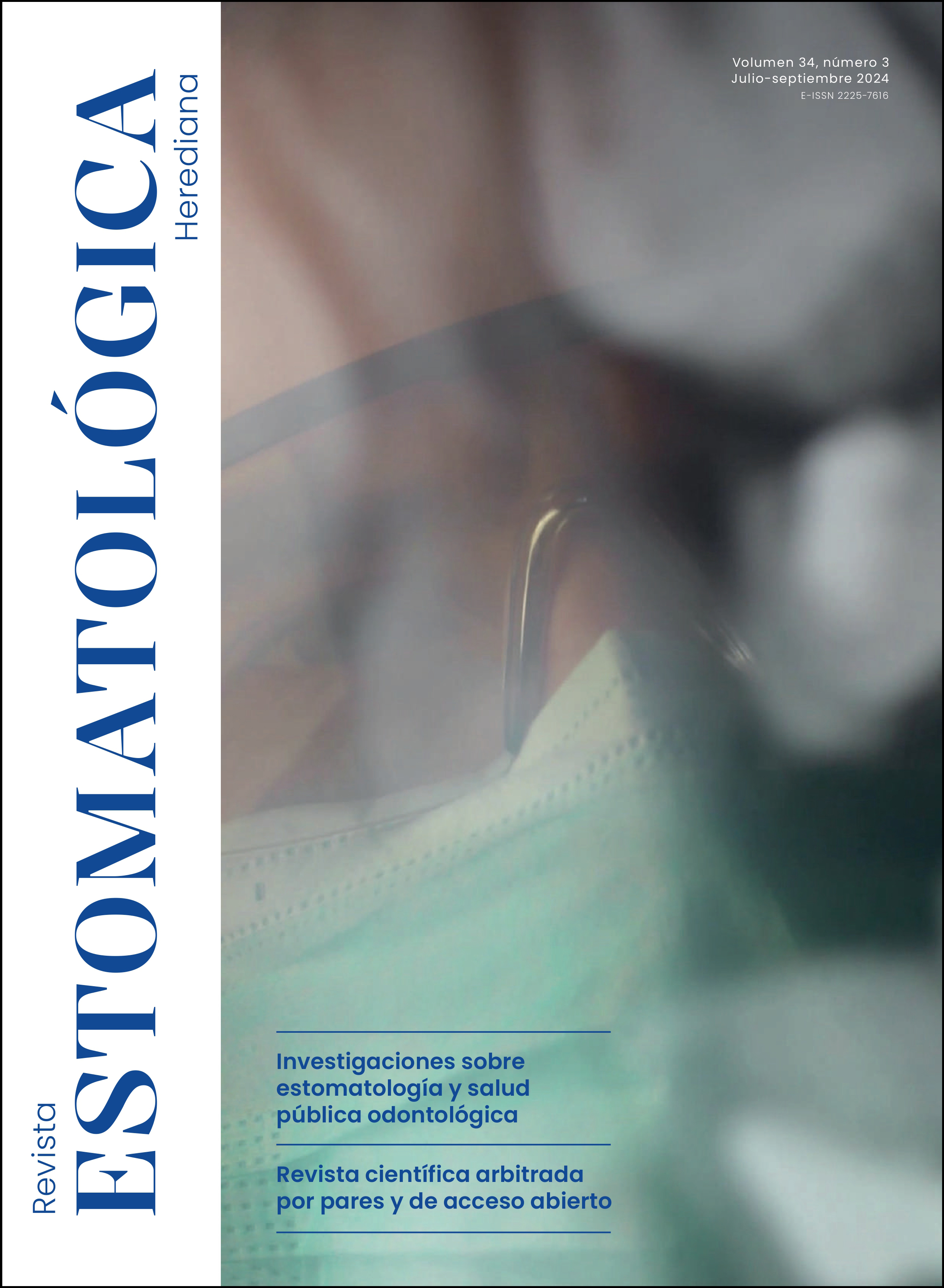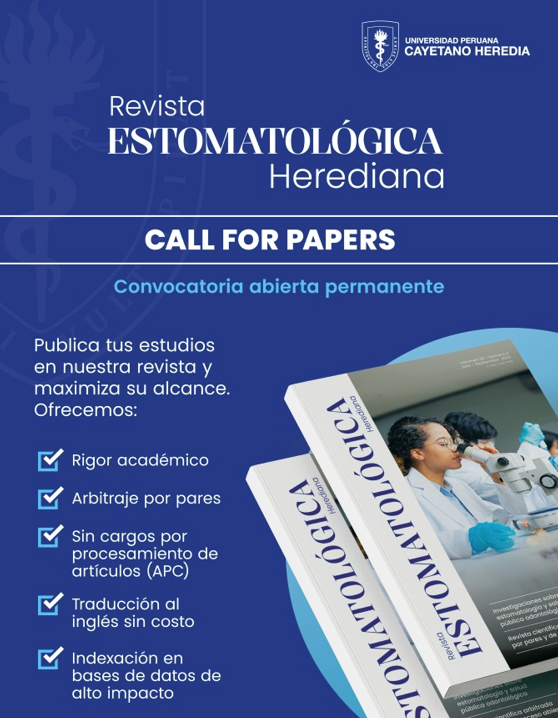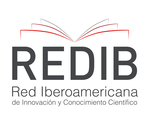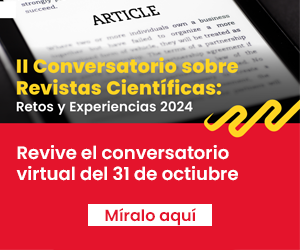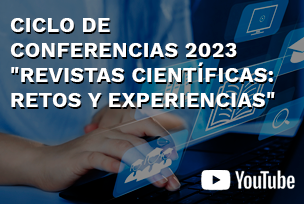Mesiodens-type supernumerary teeth evaluated through digital panoramic radiographs in a private radiology center in Manizales, Colombia
DOI:
https://doi.org/10.20453/reh.v34i3.5830Keywords:
dental anomaly, panoramic radiography, mesiodens, supernumerary toothAbstract
Objective: To evaluate mesiodens supernumerary teeth in digital panoramic radiographs taken between 2019 and 2020 at a private radiological center in Manizales, Colombia. Materials and Methods: A retrospective, descriptive, cross-sectional, observational study was conducted. The study population consisted of 1,000 panoramic radiographs from the radiological center in Manizales, Colombia, from 2019–2020. A virtual database was accessed for this purpose. The evaluated variables included age, sex, presence or absence of mesiodens, number of teeth with anomalies, tooth shape, position, location, and evolution. Statistical analysis was performed using frequencies and percentages. Results: The frequency of mesiodens supernumerary teeth was 3.8% (n=40), with a higher occurrence in males. Most cases involved a single mesiodens (n=38), with the highest number of cases in the age groups of 6 to 11 years (n=13) and 12 to 17 years (n=21), characterized by a rudimentary type and intraosseous evolution. Conclusion: Mesiodens type DS is a condition not very frequently found in the population studied; however, this study allowed us to carry out a characterization for Colombia, where there is not much scientific evidence in this regard, in order to have the possibility of contrasting it with other studies carried out nationally and internationally.
Downloads
References
Paz C, Celis C, Schilling A, Schilling J, Hidalgo A. Aporte de la radiología oral y maxilofacial al diagnóstico clínico. Av Odontoestomatol [Internet]. 2019; 35(2): 73-82. Disponible en: https://dx.doi.org/10.4321/s0213-12852019000200004
Gómez L. Incidencia radiológica de anomalías dentales en la ciudad de Guayaquil [tesis de licenciatura en Internet]. Guayaquil: Universidad de Guayaquil; 2018. Disponible en: https://biblioteca.semisud.org/opac_css/index.php?lvl=notice_display&id=303327
Goncalves-Filho A, Moda L, Oliveira R, Ribeiro A, Pinheiro J, Alver-Junior S. Prevalence of dental anomalies on panoramic radiographs in a population of the state of Pará, Brazil. Indian J Dent Res [Internet]. 2014; 25(5): 648-652. Disponible en: https://doi.org/10.4103/0970-9290.147115
Bedoya-Rodríguez A, Collo-Quevedo L, Gordillo-Meléndez L, Yusti-Salazar A, Tamayo-Cardona J, Pérez Jaramillo A, et al. Anomalías dentales en pacientes de ortodoncia de la ciudad de Cali, Colombia. Rev CES Odont [Internet]. 2014; 27(1): 45-54. Disponible en: http://www.scielo.org.co/pdf/ceso/v27n1/v27n1a05.pdf
Gokkaya B, Kargul B. [Prevalence and pattern of non-syndromic hypodontia in a group of Turkish children]. Acta Stomatol Croat [Internet]. 2016; 50(1): 58-64. Disponible en: https://doi.org/10.15644/asc50/1/8 Croata
Villavicencio J, Hernández J, Medina S. Variaciones clínicas de los mesodientes dobles: revisión y reporte de casos. Rev Fac Odontol Univ Antioq [Internet]. 2015; 27(1): 216-227. Disponible en: https://doi.org/10.17533/udea.rfo.v27n1a11
Juuri E, Balic A. The biology underlying tooth number abnormalities in humans. J Dent Res [Internet]. 2017; 96(11): 1248-1256. Disponible en: https://doi.org/10.1177/0022034517720158
Yu F, Cai W, Jiang B, Xu L, Liu S, Zhao S. A novel mutation of the adenomatous polyposis coli (APC) gene results in the formation of supernumerary teeth. J Cell Mol Med [Internet]. 2018; 22(1): 152-162. Disponible en: https://doi.org/10.1111/jcmm.13303
Loscertales M. Anomalías dentarias: prevalencia, patrones de asociación y relación con la edad dental [tesis doctoral en Internet]. Sevilla: Universidad de Sevilla; 2017. Disponible en: http://hdl.handle.net/11441/64709
Téllez C, Escobar LM, González MC, Moreno PS, Mora ÍI, Bautista GR, et al. Detección clínica de anomalías craneofaciales mayores y menores en población escolar colombiana. Univ Odontol [Internet]. 2014; 33(70): 65-77. Disponible en: http://dx.doi.org/10.11144/Javeriana.UO33-70.dcac
Wang XP, Fan J. Molecular genetics of supernumerary tooth formation. Genesis [Internet]. 2011; 49(4): 261-277. Disponible en: https://doi.org/10.1002/dvg.20715
Contreras MA, Alaejos C, Buenechea R, Beríni L, Gay C. Mesiodens: concepto, evaluación clínica, diagnóstico y tratamiento. Anal Odontoestomatol [Internet]. 1996; 4: 175-180. Disponible en: https://diposit.ub.edu/dspace/bitstream/2445/25945/1/114075.pdf
Doroteo D, Robles NL, Lara E. Mesiodens múltiples: reporte de un caso. Rev ADM [Internet]. 2011; 68(2): 93-96. Disponible en: https://www.medigraphic.com/pdfs/adm/od-2011/od112g.pdf
Rebolledo-Cobos M, Escalante-Fontalvo M. Mesiodens en posición inusual: reporte de un caso. Duazary [Internet]. 2015; 12(1): 64-68. Disponible en: https://doi.org/10.21676/2389783X.1400
Fernández E, Hernández A, Lucas P, Ortiz AJ. Manejo ortodoncicoquirúrgico de un incisivo central superior impactado debido a un mesiodens. Odontol Pediátr [Internet]. 2015; 23(3): 210-218. Disponible en: https://www.odontologiapediatrica.com/wp-content/uploads/2018/05/294_06_CasoClinico_298_Fernandez.pdf
Downloads
Published
How to Cite
Issue
Section
License
Copyright (c) 2024 Los autores

This work is licensed under a Creative Commons Attribution 4.0 International License.
The authors retain the copyright and cede to the journal the right of first publication, with the work registered with the Creative Commons License, which allows third parties to use what is published as long as they mention the authorship of the work, and to the first publication in this journal.
